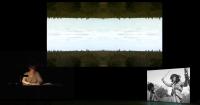 When our grandmother beheaded chicken, my brother begged: "don't kill the animals, let's go buy food at the supermarket". When did this happen? Ignoring the death of other beings in order to live. Wishing we didn't know about the destruction around our bubble. Was it when our parents moved from the countryside to the city? Was it when our thumb started to touch the screen more often? Animals? Only pets. Jungles? Only urban ones. In our houses, we clean up everything that reminds us of the dust from where we came from. Little pigs go to school, cats wear boots, play the piano and speak French, crickets are our consciousness, Elsa is the name of a depression, Katrina of a hurricane, Bárbara of a storm. Savagery instead of a country. Elements of land and sea as resources. People as users. Identities as consumption objects. Consuming, consuming to stabilise this fucked up disruption.
When our grandmother beheaded chicken, my brother begged: "don't kill the animals, let's go buy food at the supermarket". When did this happen? Ignoring the death of other beings in order to live. Wishing we didn't know about the destruction around our bubble. Was it when our parents moved from the countryside to the city? Was it when our thumb started to touch the screen more often? Animals? Only pets. Jungles? Only urban ones. In our houses, we clean up everything that reminds us of the dust from where we came from. Little pigs go to school, cats wear boots, play the piano and speak French, crickets are our consciousness, Elsa is the name of a depression, Katrina of a hurricane, Bárbara of a storm. Savagery instead of a country. Elements of land and sea as resources. People as users. Identities as consumption objects. Consuming, consuming to stabilise this fucked up disruption.
Mukanda
07.01.2022 | by Marta Lança